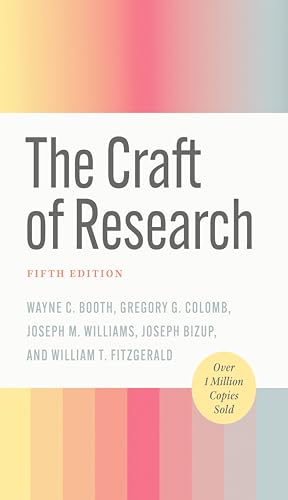
The Craft of Research, Fifth Edition
Wayne C. Booth, Gregory G. Colomb, Joseph M. Williams, Joseph Bizup, William T. FitzGerald
Publisher
University of Chicago Press
Publication Date
6/24/2024
ISBN
9780226826660
Pages
334
Categories
Questions & Answers
"The Craft of Research" primarily focuses on guiding researchers through the entire research process, from identifying a meaningful topic or question to developing it into a significant research problem and project. It emphasizes the importance of research, argumentation, and communication, and how these processes influence each other. The book offers practical advice and heuristics for turning a vague interest into a research problem, making a compelling argument informed by research, and effectively communicating that argument in writing or presentations. It covers various aspects of research, including identifying sources, evaluating their relevance and reliability, assembling a research argument, and understanding the social importance of citing sources. The book is designed to be practical and accessible, helping researchers at all levels become better thinkers and communicators.
"The Craft of Research" emphasizes the interconnected nature of research, argumentation, and communication. It posits that research is not just a solitary endeavor but a communal activity that involves sharing findings with others. The book underscores the importance of understanding the audience and tailoring research arguments to be clear, persuasive, and accessible. Key principles include:
-
Research as Communication: Research is a process of inquiry that ultimately aims to communicate findings to others. The book emphasizes the importance of sharing research with the broader community.
-
Argumentation as Central: The book focuses on developing strong arguments throughout the research process, from formulating research questions to presenting findings.
-
Ethical Responsibility: It stresses the ethical responsibilities of researchers, including integrity, transparency, and respect for participants and sources.
-
Flexibility and Adaptability: The book encourages researchers to be flexible in their approach, adapting their methods and arguments as new information emerges.
-
Clarity and Accessibility: It emphasizes the need for clear and accessible writing and communication, ensuring that research is understandable to a wide audience.
"The Craft of Research" emphasizes ethical considerations throughout its content, particularly in the context of research integrity and responsibility. The book encourages researchers to:
- Be honest and transparent: It stresses the importance of accurately representing data and findings, avoiding plagiarism, and providing proper citations to acknowledge sources.
- Respect privacy and confidentiality: Researchers are reminded to obtain informed consent from participants, protect their privacy, and handle sensitive information responsibly.
- Avoid bias and conflicts of interest: The book advises researchers to be aware of their own biases and to disclose any potential conflicts of interest that might influence their work.
- Conduct research responsibly: It emphasizes the importance of ethical research practices, such as ensuring the safety of participants and the environment, and avoiding harm.
To maintain integrity and responsibility, the book suggests:
- Critical thinking: Researchers should critically evaluate their sources and arguments, question assumptions, and be open to revising their conclusions based on new evidence.
- Collaboration and peer review: Engaging with the research community through collaboration and peer review can help ensure the quality and integrity of research.
- Continuous learning: The book encourages researchers to stay informed about ethical guidelines and best practices, and to be willing to learn and adapt as the field evolves.
"The Craft of Research" adapts to the evolving research landscape by incorporating discussions on new technologies, such as generative AI. It acknowledges the potential of AI tools for research and provides guidelines on how to use them productively and ethically. The book emphasizes the importance of critical thinking, transparency, and understanding AI's limitations to ensure the reliability of research findings. It also addresses challenges like data manipulation and plagiarism, which AI can exacerbate, by reinforcing the importance of integrity and ethical practices. The opportunities include enhanced data analysis, information retrieval, and communication, which can streamline research processes and broaden access to knowledge. The book encourages researchers to embrace these technologies while maintaining the core values of research integrity and ethical conduct.
"The Craft of Research" provides essential guidance for researchers and students, emphasizing the importance of clear communication, rigorous thinking, and ethical research practices. Key takeaways include:
- Developing a Research Question: The book stresses the importance of formulating a clear, answerable research question that drives the research process.
- Finding and Evaluating Sources: It outlines strategies for locating and assessing the relevance and reliability of sources, including peer-reviewed articles, reputable websites, and primary sources.
- Constructing a Research Argument: The book guides readers on how to build a coherent argument, incorporating evidence, and addressing counterarguments.
- Writing and Presenting Research: It offers practical advice on writing research papers and delivering presentations, emphasizing clarity, organization, and audience engagement.
- Ethical Research: The book addresses the ethical considerations of research, including integrity, transparency, and respect for participants.
The book contributes to the development of essential skills for researchers in the 21st century by:
- Encouraging Critical Thinking: It fosters the ability to analyze information critically and construct well-reasoned arguments.
- Promoting Effective Communication: The book emphasizes the importance of clear and concise communication, both in writing and presentations.
- Highlighting Ethical Responsibility: It instills a sense of ethical responsibility in researchers, ensuring responsible and transparent research practices.
- Adapting to New Technologies: The book acknowledges the role of technology in research and provides guidance on using tools like databases and online resources effectively.